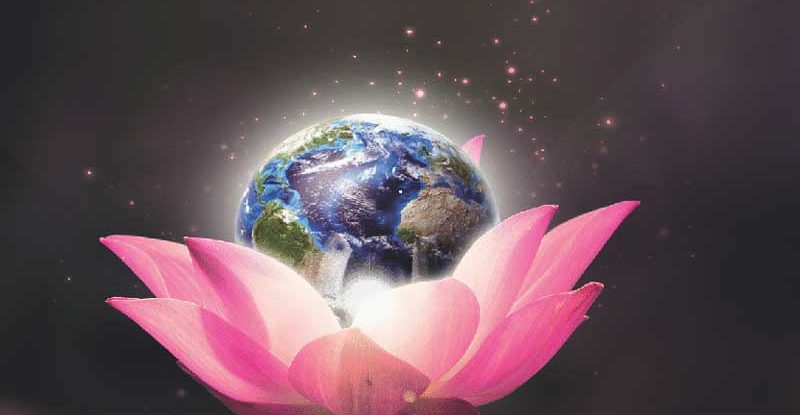Last time, in the first of our HSS (UK) Perspectives series, our Sanghchalak’s Message of Hope talked about Sanghatan and Sewa. In this second instalment, Dr Vidula Ambekar – the Marg Darshika (Guide & Adviser) for Hindu Sevika Samiti – discusses how the current challenges impact our vision and methodology.
HSS (UK) Perspectives: Time for a new Vision in Action?
The world is experiencing seismic change. Covid, environmental erosion, terrorism, weather vagaries, economic uncertainty, wildfires, national and geo-political warfare have activists from polar opposites of the political and social spectrum crying out for leadership change globally. We are living in a time where words like extinction and annihilation are no longer just storylines for comics or films. As the youth worry about what the future will look like, I as a mother, an organisational guide and elder, wonder what kind of legacy we leave for coming generations. It is a good time then to take stock and for all to re-evaluate the validity of the vision we set for ourselves and how we achieve that vision. For HSS (UK), I want to explore what our ‘Vision in Action’ means now.
In simplest terms, our vision was and has always been social transformation through the organisation of society to develop eternal, righteous and holistic values which ensure a sustainable universe. Though the method for doing this, namely our ‘shakha’, was inspired by an ideology conceived in a different time and era, I believe, it is more relevant and important today than ever before. Both the vision and methodology, however, require an articulation for today’s challenges. I want to focus on four core concepts of our vision and methodology which are critical for the future of all.
Consensus Governance
The first core element of our vision is to achieve social transformation through development of all, with a commitment beyond simply profit and even beyond people and planet. We want to develop a mindset whereby consensus governance ensures a holistic purpose. The nuance with this is that we are neither capitalist nor socialist and everyone in society is there to do a role be that leaders, rule makers, advisers, workers or members of society. This is a truly inclusive alternative which was coined as Integral Humanism. Ever since HSS UK started in the UK the vision was to develop selfless workers with a mindset that would promote universal values which our ancient seers explained through the Vedas, Upanishads and many other texts. Today, this need is even greater. The older generation accepted these values through living them but could not always articulate them in British society and the focus was initially to ensure our identity was accepted by our own Hindus as much as others. Younger generations of Hindus, who are inherently integrated and embedded in all walks of British life, have more confidence and stability and must endeavour to be the leaders and cultural ambassadors of our eternal values. Together, older and younger generations must find an expression of these values in a way that creates harmony within society not only between people of all faiths but with all creatures and nature.
Balance and Discipline
Social transformation requires a strong ideology to motivate people but unlike other movements or “ism’s”, HSS does not base this on religious, political or personality led ideology. It is based on Dharma which requires balance and discipline and is for the betterment of all through self-learning and dedication. We have evolved a time-tested methodology to ensure long term sustained change by encouraging self-discipline through regular structured activities. These activities encourage proper insight and make one aware of the deficiencies and drawbacks in humanity and the society we live in.
Many of the challenges we see today are man-made. Prevailing ideologies based on systems of hierarchy that create power circles amongst elites or those that postulate survival of the fittest and unfettered rights of the individual under the premise of equality, have given rise to unhindered materialism in the name of progress. Fuelled by the need to show their way is the best, liberal democracies as well as communist regimes have resulted in feudal systems which ignored the concept of wider responsibility and duties to more than their own primary stakeholders. Conversely, the aim of HSS activities is to instil within all our members, the mindset that duties should outweigh rights, equity should take priority over equality and all work for society should be done with humility and driven by the holistic world view of Vasudhaiva Kutumbakam – the whole world is one family. Balance and discipline to learn and purposefully work for this needs to be permeated throughout society.
Sustainability and mutual interdependence
This leads nicely to the third tenet of our vision in action – sustainability and mutual interdependence. Humanity is regarded by the Hindu philosophy not as a separate creature superior to the rest of creation, but as a part and parcel of the whole. The Hindu view of life has always advocated living in harmony with nature; such harmony necessitates voluntary restraint on consumption. A corollary of this basic premise is that self-restraint is not only inevitable for practical reasons, but also a source of universal joy and a stepping-stone for spiritual evolution. The relevance of this conservationist approach is now being increasingly recognised and encouraged. HSS’ vision in action which has always been based on mutual interdependence and a symbiotic relationship between every individual, community and nature has therefore become even more pertinent. Howsoever people choose to label it, there has to be an acceptance that no individual and no one element of nature exists purely for the pleasure or benefit of another. We are all dependent on others and the natural world. We have a responsibility to sustain that.
Self-reliance and resilience
The final tenet illustrated by our motto “swayameva mrugendatta” – we achieve by our efforts – is all about the importance of individuals and communities being self-reliant and resilient. At first this may appear contrary to the previous principle, but actually it is about integrating the core values that I have explained above into our economic, political, social and legal frameworks. Hindus in UK have consistently been lauded for their achievements as an integrated community in UK, but we have failed to sufficiently promote the Hindu narrative on those inherent values which have helped us achieve this. Self-reliance and resilience were part of those essential values which need to be asserted through the Hindu voice as they must be about aspiring for the noblest universal goals but ensuring that we start with ourselves.
Self-reliance and resilience in this context are crucially not to the exclusion of ‘others.’ It is not based on ‘our’ company/country/community being a priority and it is not about supremacy. Hindu Dharma is pluralistic, so self-reliance does not require racial or religious allegiance for one to benefit. In economic terms for example, the capacity to be self-reliant when viewed through Hindu philosophy is about humanity living with its surroundings in a way which enables universal prosperity to satisfy everyone’s need but not their greed and goes beyond just human beings’ prosperity.
Moreover, self-reliance is a means to develop resilience and sustainability. In the business world for example, corporates cannot just feed consumerism to justify continuous growth but equally consumers must take responsibility for their own insatiable pursuit of materialistic needs. To have self-reliance without xenophobia or power mentality, requires political and economic frameworks to be tools not the core that drives our purpose or policies. For a better outcome, whereby society is self-reliant and resilient without divisions, laws and regulations, politics and economics have to be integrated with a culture, philosophy and spirituality that values pluralism, universality and sustainability. Hindus in UK are, in part, an example that this is not only possible but desirable. I say, only in part, because we too have forgotten our values and there are great examples of those who were not born Hindu extolling the virtues of these values.
To conclude then, our vision has always propagated the values I have talked about based on an approach of self-knowledge and self-control because at the most basic level it is a source of individual joy, social harmony, cultural richness, spiritual advancement and universal peace. Our vision has been seen in action over the last 50 years in UK and as I reflect on the present state of the world, there is a more profound need, not for new vision in action, but for our existing vision to be a greater reality.



